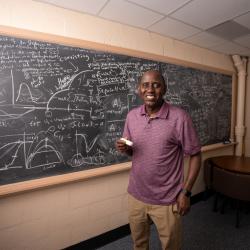UMD’s Rance Cleaveland Named Director of National Science Foundation’s Division of Computing and Communication Foundations
University of Maryland Department of Computer Science Professor Rance Cleaveland has been named director of the Division of Computing and Communication Foundations (CCF) at the National Science Foundation (NSF) for a three-year term, effective July 9, 2018.
“Rance has a remarkable ability to bring together teams of outstanding researchers for high-impact computing projects. He is well-positioned to identify breakthrough opportunities and meaningfully advance computing research across the nation,” said Amitabh Varshney, dean of the UMD College of Computer, Mathematical, and Natural Sciences. “His selection is a testament to his leadership in the computer science community, and I know that his knowledge and expertise will serve the division well.”
CCF supports nearly $200 million in research and education projects through three core programs: algorithmic foundations, communications and information foundations, and software and hardware foundations. CCF-supported projects investigate revolutionary computing models and technologies based on emerging scientific ideas, and integrate research and education activities to prepare future generations of computer science and engineering workers.
“CCF is important because it supports and helps catalyze fundamental research that forms the basis for the future education of computer scientists,” said Cleaveland, who also has an appointment in the University of Maryland Institute for Advanced Computer Studies. “That research also becomes the underpinnings of research done by other scientists, engineers and researchers. CCF’s work has tremendously broad applications in and out of computing."
Cleaveland’s personal research focuses on developing theoretical and applied methods for validating and verifying computer code, software packages and computing devices. Starting with an NSF Graduate Research Fellowship as a Ph.D. student at Cornell University, NSF has awarded Cleaveland multiple grants over the years, including an NSF Young Investigator award. In addition, Cleaveland co-founded a company, Reactive Systems, with funding from the NSF Small Business Innovation Research program in 1999. Cleaveland remains chairman of the board of the company, which tests computer code for bugs and verifies that code behaves as intended.
"I've benefitted a lot from the NSF over the years, and I felt it was time to give back to the foundation and the communities it supports," said Cleaveland, who previously served on a number of NSF review committees and panels.
At NSF, Cleaveland will oversee CCF’s program managers, who process grant proposals, create selection panels and make recommendations on what proposals to fund. In addition, Cleaveland will oversee strategic planning about what research areas CCF will encourage researchers to explore in future grant proposals.
“I’m particularly interested in nontraditional, ‘embedded’ computing systems, such as anti-lock brakes and medical devices,” Cleaveland said. “Correct behavior is extremely important in such systems because human lives can be at stake. I would like to encourage researchers to develop and apply appropriate foundational principles of computing for such systems.”
Cleaveland’s experience in embedded computing comes most notably from serving as the UMD principal investigator of CyberCardia, an NSF-funded multi-institution project performing multiscale modeling and simulation of electrical behavior in the heart. The collaboration aims to create a platform for testing and validating cardiac devices faster and at a lower cost than existing methods. In addition, the researchers want to use the platform to design optimal, patient-specific device therapies.
Cleaveland is a leading scholar in software systems, having published more than 140 papers in this area. He also serves on several journal editorial boards and is co-founder and steering committee member of the International Conference on Tools and Algorithms for the Construction and Analysis of Systems.
When Cleaveland joined UMD in 2005, he also became executive and scientific director of the Fraunhofer Center for Experimental Software Engineering, a position he held until 2014. Under Cleaveland's leadership, the center—an applied research and technology transfer organization affiliated with UMD—doubled its number of publications, more than doubled its research funding and grew its staff by nearly 50 percent.
“I think one of the most rewarding things I have done at the University of Maryland was lead Fraunhofer. I also think the combination of strategic and operational challenges I faced during that time also helped prepare me for my NSF role,” Cleaveland said. “The university supported me a lot during my time as director of Fraunhofer by giving me access to campus resources and mentoring that helped me succeed at the position. I’m very grateful.”
Cleaveland will remain a full-time employee at UMD while serving as CCF director and will have 50 days per year to devote to his Ph.D. students and collaborations on campus.
“I hope that I can help CCF find ways to demonstrate to academia, as well as the research and development community, that the foundational elements of computing that CCF works on will make people’s lives better in ways that we have only begun to perceive,” Cleaveland said.
Cleaveland received his M.S. and Ph.D. in computer science from Cornell University in 1985 and 1987, respectively, and his B.S. in mathematics and computer science from Duke University in 1982. Before arriving at UMD, Cleaveland held faculty positions at Stony Brook University and North Carolina State University.
Media Relations Contact: Abby Robinson, 301-405-5845, abbyr@umd.edu
Writer: Irene Ying
University of Maryland
College of Computer, Mathematical, and Natural Sciences
2300 Symons Hall
College Park, MD 20742
www.cmns.umd.edu
@UMDscience
About the College of Computer, Mathematical, and Natural Sciences
The College of Computer, Mathematical, and Natural Sciences at the University of Maryland educates more than 9,000 future scientific leaders in its undergraduate and graduate programs each year. The college’s 10 departments and more than a dozen interdisciplinary research centers foster scientific discovery with annual sponsored research funding exceeding $175 million.







